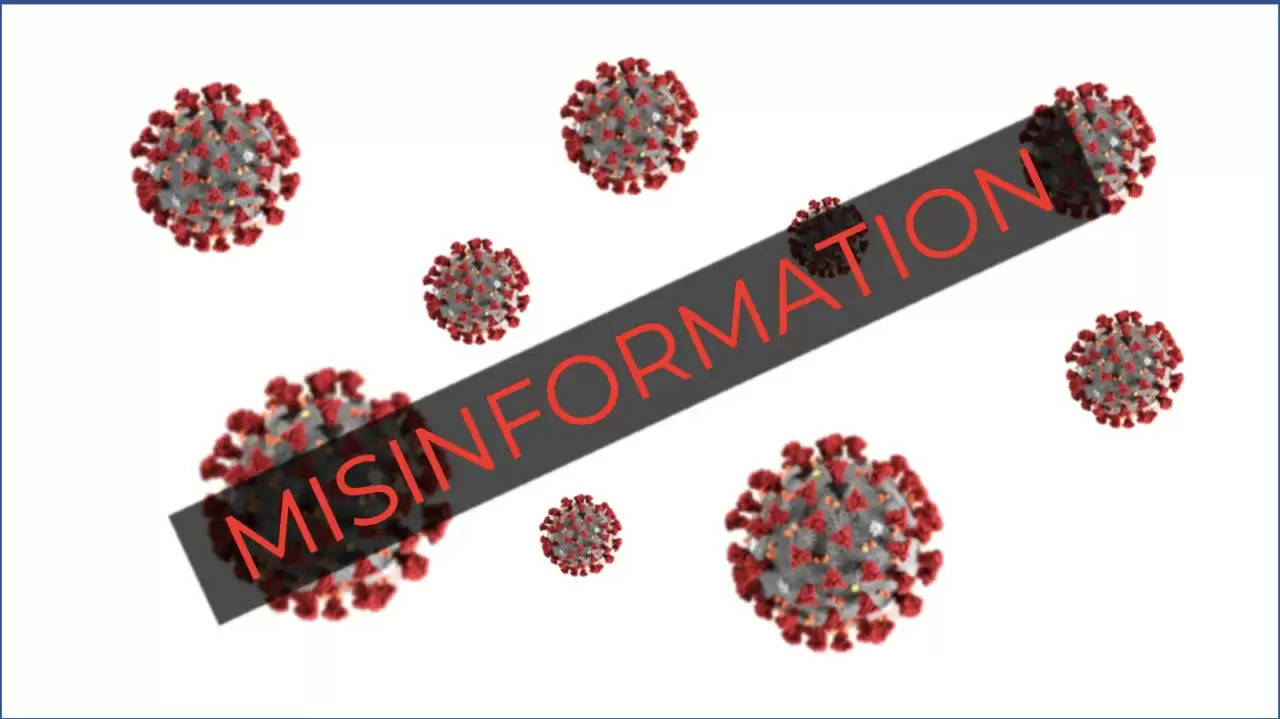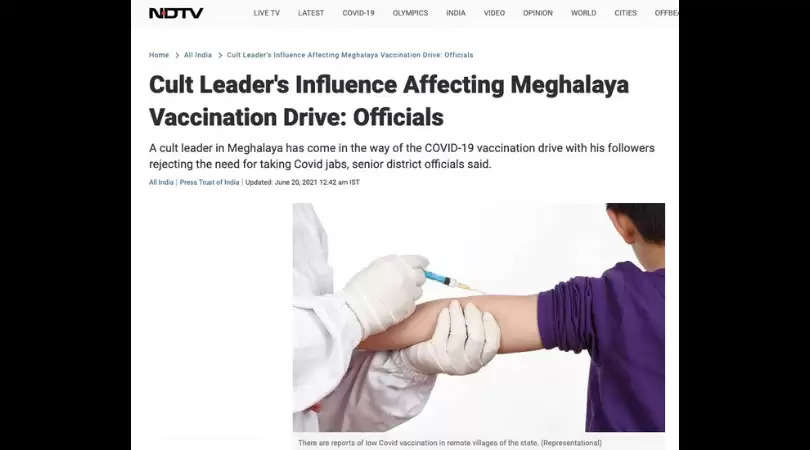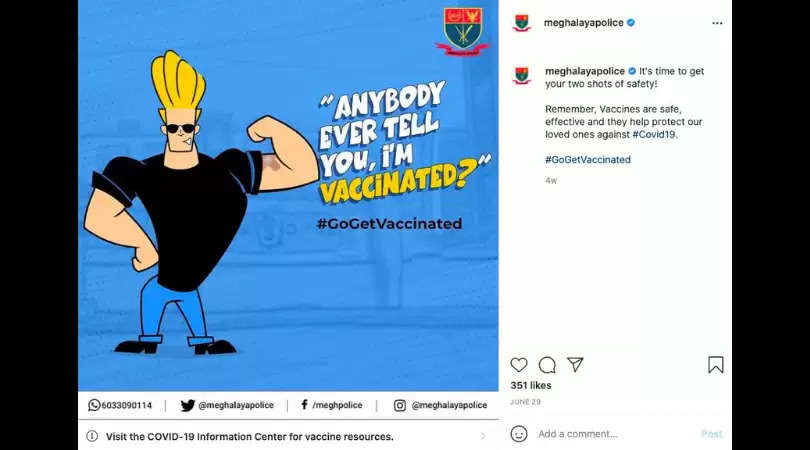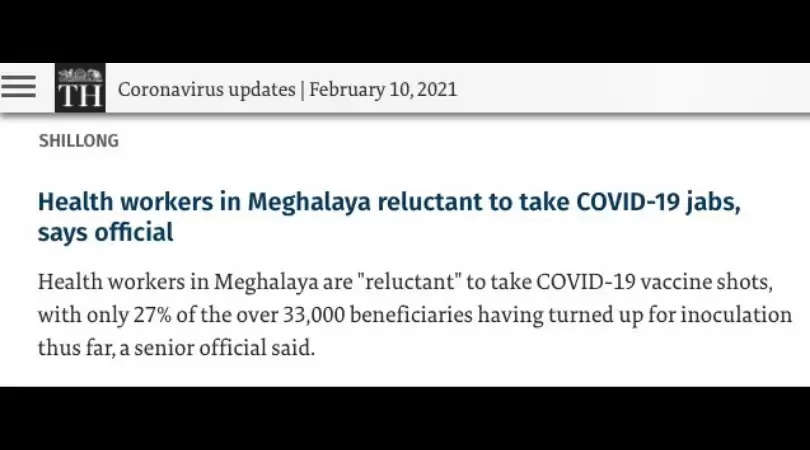Vaccine Hesitancy in Meghalaya: Experts Debunk Myths of COVID-19 Vaccine
These are some of the most common responses that one hears in Meghalaya, a state which has not yet brought the virus under control and is suffering from the reluctance of people who refuse to get vaccinated against COVID-19.

By Paulomi C Trivedi
“The COVID-19 vaccine is the mark of the beast."
“I will die within two years of getting vaccinated.”
“It’s my body and my choice to not take the jab.”
“My body will become magnetic.”
These are some of the most common responses that one hears in Meghalaya, a state which has not yet brought the virus under control and is suffering from the reluctance of people who refuse to get vaccinated against COVID-19.
The district of East Khasi Hills recently reported 21 deaths in 48 hours, out of which 19 were unvaccinated and two were only partially vaccinated with the first dose.
What then explains Meghalaya’s slow vaccine uptake, especially when the vaccine appears to be the closest thing we have to a solution against this virus right now?
Misinformation and Fake News Through Social Media
“Through the influence of social media, anti-vaxxers have been able to spread the message that to be a true believer is to depend totally on God and not upon any other external forms like vaccines”, said Rev. Lyndan Syiem, Pastor of the Mawroh Presbyterian church, under the KJP Synod Sepngi.
“They have created a false dichotomy between the vaccine and faith. This is unbiblical because the Bible teaches us to take care of ourselves and to take medicine or to exercise caution,” he added.

Misinformation with regards to the COVID-19 vaccine has spread like wildfire across the state. Ranging from physiological myths to religious ones, misinformation has been successful in keeping the vaccination count for the entire state to under 10 percent.
“They were all praying for a vaccine. Now that it has come, they don’t want to take it”, said a very angry doctor manning the COVID ward in one of the public hospitals in the state.
Chief of Nationalist Congress Party (NCP) and Gambegre MLA, Saleng A. Sangma said that rumours like the vaccine is the devil’s number (666) and that they will die within two years of getting vaccinated have taken deep root in the minds of simple villagers in rural Garo Hills.
Although some villages in West Garo Hills have achieved 100 percent vaccination, many towns still suffer from the reluctance of taking a jab, where the spread of misinformation is much faster, using modes like Facebook and WhatsApp.
The police and the government have made attempts using awareness campaigns and sanctions alike, but neither has still borne fruit as of now.


“We are tirelessly trying to educate people on the merits of the COVID-19 vaccine and they are slowly changing their minds now,” Saleng said.
Another concern that deters people from getting vaccinated is the mystery around the contents of the vaccines.
A social media post that said that the Oxford-AstraZeneca vaccine contains parts of a male foetus, has gone viral globally.
“No COVID vaccines contain foetal cells. Some of them were developed using foetal cell lines that have been synthetically produced in laboratories. Even then, the COVID-19 vaccine vials do not contain any such cells,” Shillong-born scientist Dr. Debamitra Chakravorty said.
Health and sexual reasons are other major factors for vaccine hesitancy in Meghalaya. Many believe that taking the vaccine would threaten the future of their race.
“We have people telling us that they do not want the vaccine because they’re planning for a baby”, says Gandira Ch Marak, senior health officer from West Garo Hills.
“Misinformation plays a big role in scaring people off but through various information, education, and counselling programmes, we’re trying to change their mindset”, she added.
When it comes to the vaccine, people have also made tall claims in an unfounded fashion. What is a problem however, is when such claims are posted on social media, a space inhabited more by young people.
Lenin*, a 26-year-old insurance agent from Laitumkhrah, Shillong, said on his Instagram story that “coronavirus does not affect young people” so they should not get vaccinated.
Other claims by people included mentions of how young people are the “children of God” and therefore nothing will happen to such people if they do not take the vaccine.
Fear, disinterest, scepticism, busy work schedules, and wrong beliefs affect the younger population as severely as it affects the older population. This has made them not consider the vaccine seriously, at least in the rural belts.
Other concerns are also with regards to the quality and efficacy of vaccines, questioning the government’s research and genuinity.
At the start of the COVID-19 vaccination drive in India, The Hindu in the month of February reported that health workers in Meghalaya were reluctant to take the jab, in turn affecting the decision-making of others to get inoculated.

Meghalaya has so far managed to fully vaccinate only around eight percent of its roughly 20 lakh eligible population.
However, Principal Secretary, Heath and Family Welfare Department, Sampath Kumar, said that the state has covered over 70 percent of the eligible population in urban areas because “access to information and vaccination centres is definitely higher and better in urban areas.”
The Road Ahead
Despite several criticisms for its handling of the pandemic and the vaccination drive, the government of Meghalaya swung into mission mode to tackle vaccine hesitancy in the state.
"The government of Meghalaya realised that it needs the coalition of all sections of the society in its vaccination drive. It already has the support of the Dorbar Shnongs (area headmen) and a majority of them have cooperated with the government in instilling and facilitating the government's vaccination programme,” said Rev. Syiem.
“Leaders of all faiths were invited and a meaningful discussion was held with the government", he said.
On the part of the administration, a stakeholder approach has been adopted where existing institutions are being utilised for better service delivery. A Community COVID Management Team (CCMT) has also been set up, involving traditional heads, volunteers, and other public representatives to deal with COVID-related issues at a community level.
"We have adopted a 'state capability enhancement' approach where all the government departments, field based agencies, community leaders and public representatives are working together to mobilise people in a sensitive manner by removing the underlying fear caused by misinformation", said Kumar.
Kumar is currently touring remote pockets of the state with his team of officials in an attempt to dispel vaccine hesitancy in rural Meghalaya.
"We are undertaking a direct one-to-one communication and it is giving very good results," he said.
Social influencers and observers, however, are against the antagonising of anti-vaccine people.
“A holistic approach that embraces all and tries to convince and persuade the anti-vaxxers to the benefits of vaccination and of modern medicine is a better approach”, says Rev. Syiem.
(Edited by Anirban Paul)
*name changed on request
(The author is a Shillong born-Mumbai based journalist and co-founder of WebTokri)
ALSO READ: Meghalaya, Assam among top four states with highest vaccine wastage

















